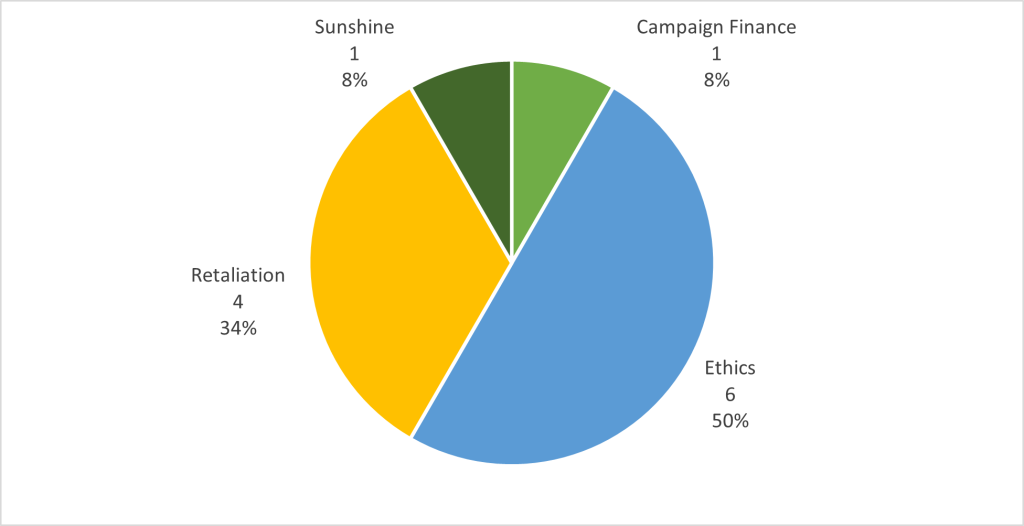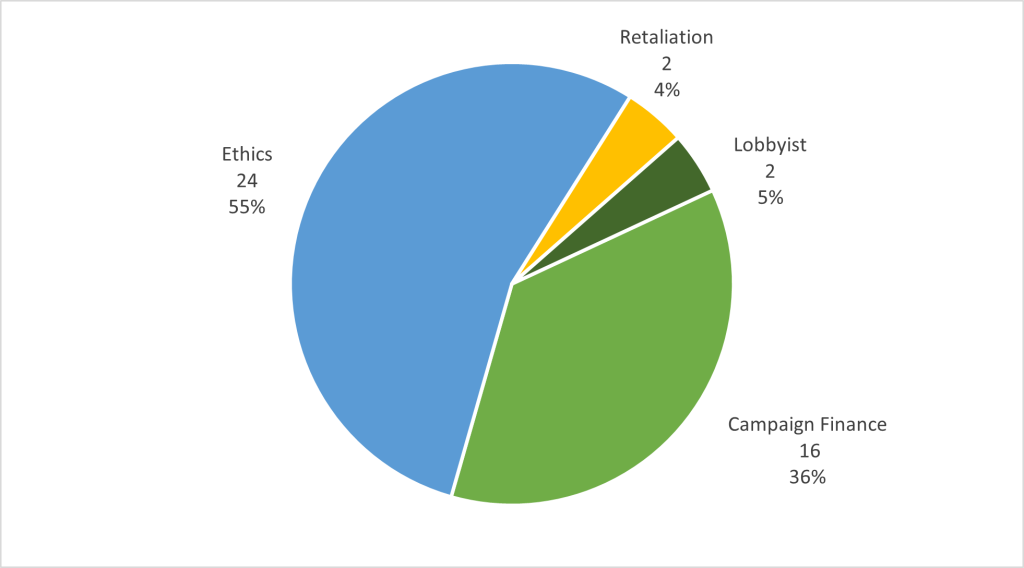March 6, 2023
To: Members of the Ethics Commission
From: Patrick Ford, Director of Enforcement
Subject: Agenda Item 4: Quarterly Enforcement Report
Summary and Action Requested
This report provides general programmatic updates and data about the cases handled by the Commission’s Enforcement Division.
No action is required by the Commission, as this item is for informational purposes only.
Background
The Commission’s Enforcement Division is responsible for investigating violations of state and local laws relating to campaign finance, lobbying, conflicts of interest, governmental ethics, and whistleblower protection. Enforcement matters are initiated both in response to complaints the Division receives from members of the public and by the Director of Enforcement based on information contained in public records, media reports, and other sources.
All enforcement matters are first examined through the preliminary review process, which assesses whether there is reason to believe that a violation of law within the Commission’s jurisdiction has been committed. Matters will be dismissed in preliminary review if they are outside of the Commission’s jurisdiction, lack sufficient evidence to support further investigation, do not allege violations of the law, pertain to conduct that has already been investigated or resolved, or other similar bases that indicate an investigation would not serve the interest of justice.
Matters that are not dismissed in preliminary review are opened as investigations. The Enforcement Division seeks evidence through the investigation that would indicate whether a violation of the law has been committed. This may include interviewing witnesses and respondents, reviewing documents, and issuing subpoenas when necessary. Details about any matter that is opened as an investigation are shared with the City Attorney’s and District Attorney’s offices so that those offices may determine whether they wish to pursue civil or criminal penalties, respectively.
If the Enforcement Division finds evidence indicating that a violation of the law has been committed, it will seek to resolve the matter by securing penalties from the respondent in one of two ways. First, the respondent may enter into a stipulated settlement agreement with the Commission in which the respondent admits to violating the law, agrees to pay a penalty, and may need to take remedial action such as filing a missing disclosure form. Alternatively, the Enforcement Division may initiate an administrative hearing process before the Ethics Commission.
Cases Resolved
Fiscal Year 2023
So far in Fiscal Year 2023 (July 1, 2022 – March 1, 2023), the Enforcement Division has concluded a total of 98 enforcement matters. Two of these matters resulted in stipulated settlements approved by the Commission. In total, these settlements represented penalties of $23,600.
Cases In Progress
So far in FY23, 68 enforcement matters have been initiated. The majority of these (57) began from complaints that the Commission receives from the public, but this also includes 11 matters that the Division initiated based on media reports, observations in public disclosures, independent research, findings from audit reports, and interactions with regulated persons. Some of these matters initiated in FY23 remain in progress while others have already been resolved.
In total, 56 matters are currently in progress, including matters that were initiated during FY23 and matters that were initiated in prior fiscal years. Of these matters, 12 are in preliminary review, and 44 are open investigations.
The current cases in progress are broken down by program area in Charts 1 and 2 below.


Six of the 44 investigations (14%) are currently more than two years old. This is down from the time of the last Enforcement Report in November, when 7 of 49 investigations (14%) were more than two years old, and from May 2022, when 12 of 48 investigations (25%) were more than two years old. This reduction reflects the Division’s ongoing focus to resolve older cases and to timely address newer cases before two years has elapsed. The Division continues to work toward the goal of resolving all cases within two years, in accordance with the Case Closure Plan. However, there are a variety of reasons a matter might not be resolved within two years, including respondents pursuing all available due process rights, respondents or other sources not readily releasing evidence, complex factual investigative work, coordination with another law enforcement agency, and investigative holds requested by the District Attorney or City Attorney. At this time, all of the 6 cases that are more than two years old are either in the administrative hearing stage or are in settlement negotiations.
Current Initiatives
The Division is currently pursuing a number of initiatives that will continue to build the Commission’s enforcement capacity. This work is done in order to better conduct thorough, high-quality investigative work, develop more high-impact cases, and achieve more efficient case resolutions. This section summarizes some of the primary initiatives currently underway.
Launch of New Case Management System
The Division has been collaborating with the Commission’s Electronic Disclosure and Data Analysis (EDDA) Division to develop a new case management system that the Division will use to administer enforcement matters. The new system was fully launched on February 24th. The system integrates case data tracking with case document management, so that only one system need be used (previously two systems were needed to accomplish tracking and document management). The system also provides for significantly expanded case data tracking, which will allow faster and more thorough communication between investigators who are collaborating on a case and provide a more detailed picture of the current status of each case. Senior Investigator Eamonn Wilson led much of the Enforcement Division’s work on this project and leveraged his background as a performance auditor with the California State Auditor, where he evaluated the performance of systems and processes used by state and local government agencies.
As part of the transition to the new system, all cases were assigned a new case number. For cases that are already before the Commission, documents will use both case numbers to refer to the case. Otherwise, the new case numbers will be used.
Streamlining Preliminary Review
In addition to streamlining the investigation phase in accordance with the Enforcement Division’s Case Closure Plan, the Division has also made progress in streamlining the preliminary review stage. Preliminary review is the first stage of each case, and in this stage initial analysis and fact finding seeks to determine whether there is reason to believe a violation has occurred and, if so, whether an investigation should be opened to fully investigate the case.
The Enforcement Division has sought to make preliminary reviews more efficient and timely by establishing benchmarks for preliminary review completion, using case tracking data to better monitor the status of preliminary reviews and balance investigator workloads, and by prioritizing more complex and important cases that will require more time to conduct the review. Another significant factor in reducing preliminary review time has been the greater number of investigators on staff during the last two fiscal years. Through these methods and increased staff, the Division has been able to significantly reduce the amount of time taken on average to complete preliminary reviews. Table 1 below provides the average preliminary review times for the current fiscal year and each of the prior fiscal years. Preliminary reviews in the current year take 103 days on average, which is one-third the time taken in FY21. The Enforcement Division has the goal of completing preliminary reviews within 90 days on average.
| Fiscal Year | Average Time Spent on Preliminary Reviews completed in Fiscal Year (Days) |
|---|---|
| FY20 | 248 |
| FY21 | 313 |
| FY22 | 117 |
| FY23 (7/1/22 – 3/1/23) | 103 |
Hiring
There are currently two vacancies in the Division: one Senior Investigator (1823) and one Investigator (1822). Although filling these positions was a top priority at the time of the last Enforcement Report and recruitment for the 1823 position was initiated, hiring has been paused because of the budget instructions from the Mayor’s office which require City departments to plan for potential target cuts in the upcoming fiscal years. Hiring may resume depending on the outcome of the FY24 budget process.
Administrative Hearings
Summary of Laws Governing Probable Cause Process and Hearings on the Merits
The Enforcement Division, in collaboration with the City Attorney’s office, is developing a written resource that summarizes the laws governing the Commission’s probable cause process and hearings on the merits. The purpose of the resource is to assist the Commission and the public in understanding the legal processes in place for the Commission to consider the evidence in a case and determine whether a violation has occurred. These processes are core features of the Commission’s role as an administrative enforcement body, a role that was established in the City Charter when the Commission was first formed. In instances where the law is silent on particular aspects of the enforcement process, the resource will describe options for potential use by the Commission to achieve a full, timely, and effective resolution of the substantive issues presented in a proceeding.
The Enforcement Division anticipates providing this document, which will be a public document, to the Commission at its April meeting.
Hearing Updates
In the second quarter of FY23, the Division served probable cause reports in multiple cases in which violations were discovered through the investigation but settlement negotiations were unable to conclude the case. In three of these cases, a public finding of probable cause has been ratified by the Commission. The cases are In the Matter of Paul Allen Taylor (SFEC Case No. 1920-031), In the Matter of Progress San Francisco, Vince Courtney, Jr., and Shawnda Deane (SFEC Case No. 2021-025), and In the Matter of Victor Makras (SFEC Case No. 2021-001). The determinations of probable cause in these cases are available on the Commission’s website. The Enforcement Division continues to seek settlement of these cases while also moving forward with the administrative hearing process. Absent settlement, the Division anticipates requesting that the Chair agendize a hearing in one or more cases during the last quarter of FY23.